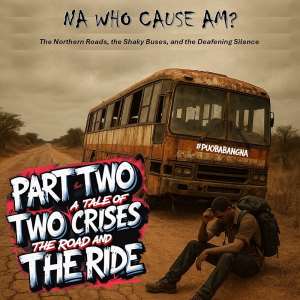
The road to the North isn’t just bad—it is a wound in the soul of our nation. From Tamale to Wa, to Nandom, Tumu, Jirapa, and beyond, the highways that should be lifelines have become slow-bleeding injuries that never heal. You don’t drive on them—you survive them.
You see, in Ghana, traveling by road is like entering a gamble. Road travel has become a form of national suffering. But when you’re heading North, it stops being just uncomfortable—it becomes spiritual warfare. That gamble turns into a test of faith and physical endurance. Every bend holds a surprise, not the pleasant kind, but the kind that makes your heart leap and your back ache. Every stretch test your nerves, your patience, your bones, and your sanity. The road throws things at you—not just dust and stones, but questions about your worth and dignity as a citizen.
You don’t know fear until a bus you’re in swerves at top speed to dodge a hole the size of a bathtub—only to land in another one a few meters ahead. Potholes don’t appear occasionally; they come in series—some shallow, others deep enough to flip a tricycle. In the rainy season, the roads turn to rivers and swamps, swallowing tyres and draining tempers. In the dry season, they bake into cracked earth, sending clouds of dust into your nose, ears, mouth, and soul.
And the ride itself? That’s Crisis Number Two.
Once upon a time, Intercity STC was a proud name—reliable, respected, and regulated. Today, it feels like a company on life support. The buses that still carry the brand are groaning relics of a better past. Some feel like they should be in museums, not motor parks. The suspension is so bad it feels like you’re riding directly on the axle. Every bump echoes through your spine. The windows rattle as if they’ll fall off. Seats have lost their cushions, and doors close with more prayer than precision.
And don’t even get me started on air-conditioning. If it exists at all, it either blows hot air or makes noise just to mock you. So passengers resort to fanning themselves with handkerchiefs, plastic bags, or simply surrendering to sweat.
Still, they’re considered the “best” option.
Private buses? Sometimes worse. You’ll board a bus in Tamale thinking it’s heading straight to Lawra, only to discover it needs a new fan belt halfway, or the clutch gives up entirely in Sawla. Drivers will stop for hours waiting for spare parts or leave you stranded because “another car is coming.” Journeys that should take eight hours end up dragging for twelve, fifteen, even eighteen hours. Babies cry. Elders groan. Bodies twist into odd shapes in an attempt to sleep. And no one—no one—arrives refreshed.
In these moments, something changes in you. Sitting on a rickety bus crawling through mud and gravel, you begin to question: Do our leaders ever take these routes? Do they know what it feels like to sit in sweat and frustration, for hours, in vehicles that feel like coffins with tyres?
Because it’s not just the infrastructure that’s broken—it’s the spirit of a people slowly being worn down by years of neglect and normalized suffering.
But perhaps the worst part is this:
We’ve gotten used to it.
The potholes don’t shock us anymore. The breakdowns don’t surprise us. We laugh about it. We murmur to our seatmates. We blame “politicians” in general, then we descend from the bus, stretch our backs, and go on with our lives—as if it’s normal to travel like refugees in our own land.
But it is not normal.
And it is not okay.
Because the moment you accept dysfunction as a way of life, you’ve given up the right to expect better.
So again, I ask—not out of political mischief, but from the gut-wrenching place of disappointment:
Na who cause am?
Who allowed this rot to become tradition?
Who looked away while our roads cracked and our buses broke?
Who clapped and danced at campaign promises only to be driven home in despair?
These are not mere inconveniences. They are national embarrassments. They are roadblocks—both literal and symbolic—on the journey to progress and justice.
But this isn’t even the full story.
Because when I finally got to Eggu—my hometown—I thought I’d left the worst behind on the road. I thought the suffering would ease. I thought, at least, home would offer comfort.
But I was wrong.
Up next: Part Three – “The Silence of the Victims, The Loudness of the Problem”
#Puobabangna
(The Northern Roads, the Shaky Buses, and the Deafening Silence)
By Victor Raul Puobabangna from Eggu, in the Upper West Region of Ghana


